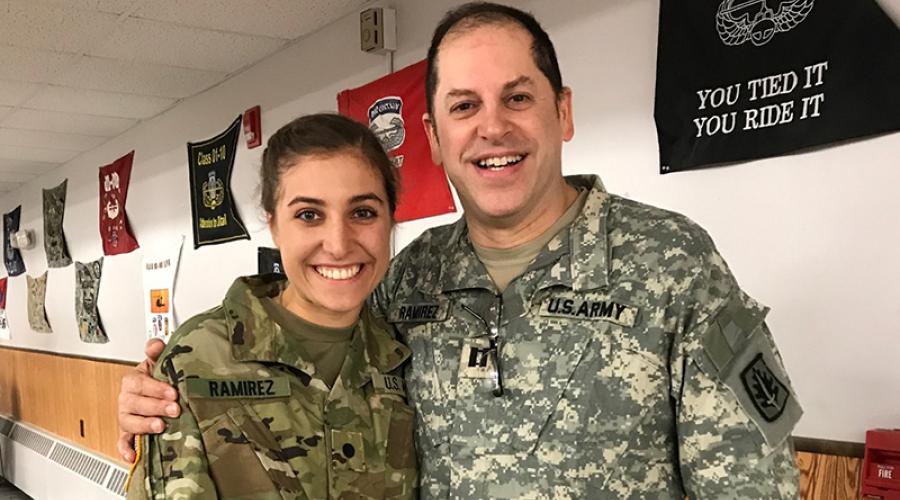
Balancing a Multi-Dimensional ILR Experience
As some Cornellians begin their Monday routines, Claire Ramirez ’21 has already been up for hours – completing her morning workout and a two-hour ROTC class with fellow cadets.
ROTC classes, which Ramirez takes on top of her student course load, provide both tactical training and skill development, preparing her for her post-ILR career in the military.
“During our class time, we focus a lot on the leadership roles we'll be put into upon graduation and commissioning, and we identify which behaviors to exhibit in the situations we'll encounter in order to lead most effectively,” Ramirez said.
In addition to the weekly workout and class schedule, ROTC cadets complete weekend field training exercises, land navigation training days and participate in community groups like College Mentors for Kids. Ramirez is also responsible for development of younger cadets and serves as a point of contact for any questions they have as they begin their ROTC program.
How does Ramirez, a sophomore, balance her academic and ROTC responsibilities?
“I have to remember that they are really one and the same,” Ramirez said.
“By advancing academically, I will also be advancing myself as a cadet. Believe it or not, when ranked up against all the other cadets in the country to compete for military job placements, the biggest contributor is GPA.”
Ramirez also believes that the training she receives through ROTC provides her with the skills she needs to succeed at Cornell.
“The discipline we must hold for the ROTC program translates very directly into discipline in our studies, empowering me to do what it takes to excel in my classes,” she said.
After graduation, Ramirez plans to join the National Guard, and is interested in working in its financial branch. Ramirez also hopes to attend law school and study labor-related issues, an interest that drew her to ILR.
When it comes to career planning, she credits her leaders within the ROTC program with helping her set and achieve strategic goals.
“One of the best strategies I've learned is to stop comparing myself to other cadets in the program. As future army officers, we are given such a vast variety of military and civilian options to strive for. Within Cornell's program, I have been lucky enough train alongside students who are on many different and unique paths.”
And, she said, “Vocalizing my goals to my military instructors has allowed them to help me move in the direction I need to go in order to achieve them.”
Ramirez broadened her college experience this winter through ILR Cornell in Vietnam.
“I think the biggest thing I’ve learned from the trip is how valuable it is to make connections with people internationally. So much of our trip was made possible because Cornell and our program instructor, Richard Fincher, had been establishing a good relationship with Ton Duc Thang University -- where we stayed and learned -- and its administrators for years.”
“Some of their students will be coming to ILR this summer to participate in the Cornell Summer Debate Program, and some of our students will be return there to teach English, which will help to maintain those ties into the future. Personally, my relationships with the Vietnamese students have also helped inform my own knowledge and research, and given me perspectives that I would not have been able to find had I not gone there and gotten to know them.”
During the Vietnam trip, students had many opportunities to experience Vietnamese culture, Ramierez said.
“Vietnam is so different than the U.S., and, for that reason, we had to rely pretty heavily on our new friends from Ton Duc Thang to show us around, help us order food, inform us of customs and courtesies, and other things like that. Their hospitality and our reliance fostered a trust between us, which in turn created a better environment for cultural exchange.”